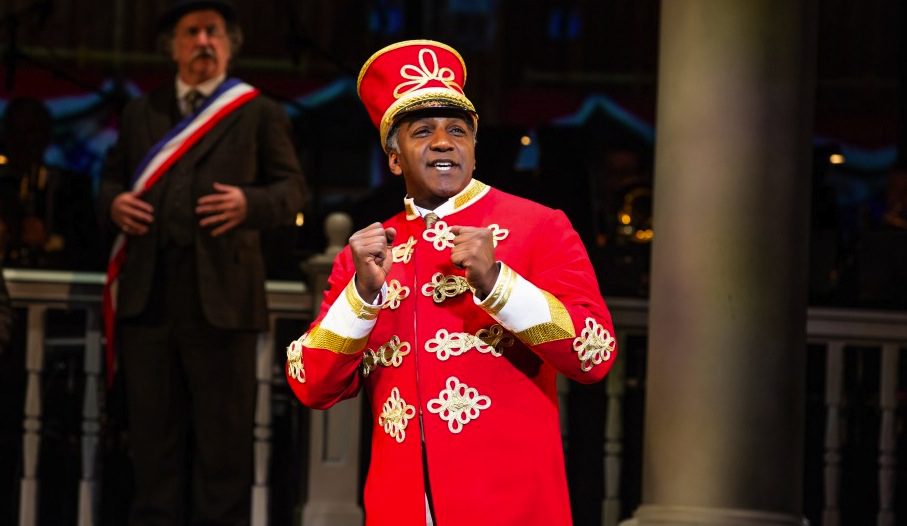‘The Music Man’ Fresh for Young, Old and Hip Alike
By • February 8, 2019 0 1126

Let’s face it. The 1957 musical, “The Music Man,” by Meredith Willson is a chestnut — something of a war horse, an Americana salute to a fairy tale-like America, circa 1912, like a joyful, desirable dot on the map in Iowa, by way of “Our Town.”
Let’s face something else, too. “The Music Man” can also be, in many of its generously given moments, as fresh as a memory of the night before, as new as next weekend. In its various strands of sometimes improbable plot, it seems, without intention or trying, echo our own current predicaments. The old and the new come together and sort of get mixed up with each other amidst the remarkably varied and diverse musical score.
You can get all of that and be the richer for it in the current production at the Kennedy Center’s Eisenhower Theater. As part of its Broadway Center Series, these short-run revivals of American musical favorites purport to be a scaled down versions of the originals, energized by short rehearsal times and instances of occasional staged readings. Although in this production, they’re barely visible.
This production of “The Music Man,” directed with great pizzazz by Marc Bruni, is the second in a trio of BCS shows. The first was a dexterous fun night at the theater version of “The Little Shop of Horrors,” while a production of “The Who’s Tommy” rounds out the trio April 25 to 28. “The Music Man” finishes on Monday, Feb. 11. So, if you can, try, try to get a ticket. It’s a guaranteed happy time for cool hipsters and older Broadway fans alike, old feet and folks in runner’s sneakers alike.
As a product, and a show, “The Music Man” is fairly familiar in all of its hues and versions.
It’s the tale of a con man and traveling salesman named Harold Hill, who drops off a train-full-of-his ilk in River City, Iowa, with the full intention of: pitching a scheme to get donations for uniforms and instruments for a non-existent marching band, which the town is sadly lacking. He’s also interested in perhaps seducing the town librarian Marian Paroo, the attractive and single keeper of the flame of books and barely fluttering intellectual interest in town. Marian—the Librarian—lives with her mother Mrs. Paroo and super-shy little brother Winthrop in a town full of aimless and hidebound denizens not very much inspired by much of anything.
Played by Norm Lewis, Hill with fast talking — and we do mean really fast fast-talking charm and that rhymes with, um, farm — changes everything. Seriously famous as a con man, and in pursuit of his con, Hill nevertheless gets the painfully self-conscious brother to talk, gets the school board members who are supposed to check out his credentials to instead coalesce into a barbershop quartet, gets the mayor’s wife to pursue the art of dance — all while evading the mayor’s relentless pursuit to expose him. Naturally, even Marian, skeptical and practical, succumbs to his charms, and more notably, Hill succumbs to her, probably just by listening to her sing in her amazing soprano, as personified by Jessie Mueller.
This is all familiar stuff—and ends in triumph, in “76 Trombones,” where it began, in true love and true guff. If you’re of a mind, it’s also irresistible and not without its resonance. The River City denizens are after all living a flat life, somewhat isolated and not immune to the hustle of a hustler, a state of mind that stubbornly survives.
But that’s not important—and not all that much either is the presence of Rosie O’Donnell, who manages to squeeze all the Irish clichés out of playing mother Mrs. Paroo without doing too much damage to the nurturing character.
Listen to the rhythms from the beginning rat-a-tat of the salesmen on the train, a foot-tapping patter that could past for Midwestern rap. There’s Lewis, insistent as a rooster sounding the alarm, but with lots more sex appeal and charm, as he warns the town folks of the presence of a pool hall which means “Trouble.” There are the chitty-chatty tones of female Iowa gossip in “Pick a Little Talk a Little,” the silly “Shipoopi,” the sway-inducing singing of barbershop quartet music, and the enduring ballads “Til There Was You” and “Goodnight, My Someone.”
“The Music Man” in its original Broadway version starred Robert Preston as the Music Man in an indelible performance, which he repeated in the movie version. Barbara Cook was the original Marian, followed by Shirley Jones in the movie.
The music—and the choreography and the production as a whole—seem like American conventions, but they are also inventions and highly inventive when put in motion. If this is a scaled down version, god bless the scale anyway, with the orchestra on the stage, and the sets breathing in and out the air of small town America, real or imagined.
Let’s not forget that Iowa remains relevant. Come next year hundreds even thousands of Harold Hills in political and media guise will ring every door bell, will fill every town hall in cities like Ames, Des Moines, Cedar Rapids, Iowa City, Sioux City, Waterloo and Mason City, Meredith Willson’s home town for the grand spectacle of the Iowa caucuses of the 2020 presidential primary elections.
“The Music Man” runs through Monday at the Kennedy Center, 2700 F St. NW — 202-467-4600 — kennedy-center.org.

